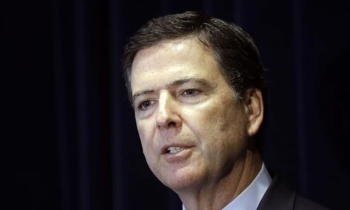All is woe and darkness in the house of media. If you were measuring journalists' public standing on a scale of 1 to 10, 10 being the best, right now we're in less-than-zero territory, thanks to The New York Times and its dodgy handling of the Plame spy case.
A few days ago, as the entire politico-media establishment was on 24-hour indictment watch, The New York Sun reported that widespread criticism of Times reporter Judith Miller -- she of the notorious tete-a-tetes with vice presidential aide Scooter Libby -- might make her a weak witness in any case brought against White House officials.
Noting that Miller's credibility has come under "sharp criticism," even by her own colleagues and editors, The Sun's story quoted George Washington University law professor Jonathan Turley: "The government is used to dealing with conflicted and questionable witnesses in the form of mob informants and drug dealers. They don't normally expect to have to rehabilitate a New York Times reporter."
Mob informants and drug dealers -- journalism's new peers. Can it get any worse than this?
It can, and it probably will. But it shouldn't. The great flaw of media-scandal coverage is that it's so intramural: journalists covering other journalists in trouble. To extend Turley's wicked metaphor, this is a bit like assigning a second cousin of the Gambinos to cover The Family's latest criminal trial.
Naturally, other media types look at the Times-in-Turmoil and think that the world is coming to an end. News people are bad-news addicts anyway, and the inherent narcissism of these scandals just reinforces the tendency. The fact that we're having this downswing at exactly the same time as the Bush administration's own career depression, and that the two are genetically linked through the Fitzgerald inquiry, would seem to seal the case for unmitigated despair. Journalism is a sinking ship, and it's taking civilization down with it.
Except it isn't. There are good reasons to view media scandals in general, and the Times scandal in particular, as encouraging developments. A strange thought, perhaps, bordering on the perverse, but bear with me.
First is the simple fact that these events are happening at all. Once upon a time, there were no such things as media scandals, not as we understand them today. Oh, isolated reporters got in trouble from time to time and saw their work discredited. Occasionally, entire news outlets lost face for slanted or downright wrong coverage, and the public decried such abuses. The phrase "yellow journalism" was once roughly as popular as "bling" is today. Dewey didn't defeat Truman.
But these were exceptional moments. What's happened in the last 25 years is that the media scandal has gradually become a regular fixture of popular culture. The Washington Post's Janet Cooke scandal -- in which a reporter admitted she had made up a sensational, Pulitzer-winning story -- was the first truly modern media scandal. That is, it was the first to grip an increasingly electronic society in one of these hormonal mass frenzies that are now so familiar, in which outrage mixes with schadenfreude-tinged excitement until it's hard to tell one from the other.
The Cooke scandal was also the first to tap the news trade's then-emerging powers of self-scrutiny. Other news outlets covered The Post's shame and investigated its sins with a competitive verve that would have seemed impossible just a few decades earlier. ("Newspapers write about other newspapers with circumspection," A.J. Liebling once wrote.)
And the paper investigated itself, too. Post Executive Editor Ben Bradlee gave the paper's ombudsman, Bill Green, complete independence, asking only that he tell it all and leave out nothing that might haunt the paper down the road. The result, a long piece called "Janet's World" published in April 1981, is still the model to which every internal media scandal investigation should aspire -- comprehensive, unsparing, smart, and, to boot, absolutely engrossing. The leadership of the The New York Times might want to give it a scan this weekend.
Of course, the Cooke affair followed fairly closely on the heels of Watergate and laid low the very outlet that had triumphed in that story. Suddenly it was clear that devastating scandals don't just happen to presidents. Media people are powerful, too, after all. From then on, whenever powerful journalists ran seriously amok and were found out, they would suffer roughly the same indignities an ensnared president suffers: embarrassment, investigation, expiation, loss of public respect. As with political scandals, the cycle has become familiar and routinized. The Internet has intensified the process by adding countless new media constables, many self-appointed, and giving them real power.
The news business once operated as a kind of private club. Now it behaves more like a public utility in which every news consumer is a stockholder. If the stockholders (through their proxies, the media critics, bloggers, and other press-watchers) push for an investigation of a suspicious news story or journalist, they get it. The outlet under suspicion really has no choice but to obey.
The real lesson of the Times scandal is not that the media are evil. It's that the Age of Media Arrogance is over. The news culture is under the public's thumb. It is more transparent, more answerable for its mistakes, and more likely than ever to clean up its act. Can anyone seriously argue that this is bad news?
William Powers is a columnist for National Journal magazine, where "Off Message" appears. His e-mail address is bpowers@nationaljournal.com.









